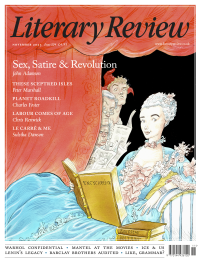Tommy Gilhooly
Dateline Chaosmos
Jabberwock
By Dara Kavanagh
Dedalus 442pp £12.99
‘When words cease to cling close to things, kingdoms fall, empires wane and diminish.’ Ezra Pound’s maxim is so fitting it is surprising that Dara Kavanagh did not use it as an epigraph. Jabberwock takes Pound literally: during the Second World War a counterfeit language is coined and disseminated by an elusive underground ‘brotherhood’ to sabotage Britain. We follow (albeit in a charmingly digressive manner) the various ventures of a journalist named Hackett throughout Europe as he tries to get to grips with this fake language gone viral.
Kavanagh shows a distinctly Joycean obsession with how words can splinter, compound, make for puns and evolve. The novel revels in typographical mayhem as we share Hackett’s bouts of linguistic vertigo: ‘Put simply, words and their parlous proximity had been the root cause of his illness.’ Jargon becomes pathologised

Sign Up to our newsletter
Receive free articles, highlights from the archive, news, details of prizes, and much more.@Lit_Review
Follow Literary Review on Twitter
Twitter Feed
Literary Review is seeking an editorial intern.
Though Jean-Michel Basquiat was a sensation in his lifetime, it was thirty years after his death that one of his pieces fetched a record price of $110.5 million.
Stephen Smith explores the artist's starry afterlife.
Stephen Smith - Paint Fast, Die Young
Stephen Smith: Paint Fast, Die Young - Jean-Michel Basquiat: The Making of an Icon by Doug Woodham
literaryreview.co.uk
15th-century news transmission was a slow business, reliant on horses and ships. As the centuries passed, though, mass newspapers and faster transport sped things up.
John Adamson examines how this evolution changed Europe.
John Adamson - Hold the Front Page
John Adamson: Hold the Front Page - The Great Exchange: Making the News in Early Modern Europe by Joad Raymond Wren
literaryreview.co.uk